Panicked Mom In Disbelief When Her Mother-In-Law Defends Her Dog After He Attacked 9-Month-Old Baby Unprovoked
A mom was beside herself when her mother-in-law's 22 lb dog attacked her 9-month-old daughter. The kicker was OP's MIL taking her dog's side and blaming everyone else, including the baby, for the incident.
OP and her daughter were playing on the living room floor. Her MIL's Shetland Sheepdog was across the room when OP heard a noise.
Before OP could react, the dog was already charging at her daughter. The dog grabbed the baby by the face and was viciously shaking her.
He only let go after OP kicked him. OP picked her baby up and saw blood pouring from her eye while the rest of her face and head were covered in bite marks.
OP ran upstairs to where her husband and MIL were. OP's husband ran downstairs, picked up his mother's dog, and threw him outside as soon as he saw his baby's injuries.
OP's MIL yelled at her son to leave the house for manhandling her dog. They rushed their baby to the hospital.
The dog missed the baby's eye by a centimeter, but her injuries were still severe. MIL told them to leave her house as soon as they got home.
She felt it was unfair to her dog if OP and her family stayed. She said her dog didn't deserve to be punished for what he did.
OP made it clear that the attack was unprovoked. Her baby didn't tug on the dog's fur, she wasn't playing with his toys, nor was she anywhere near his food bowl.

OP is unsure if her feelings toward her MIL and her dog are justified.
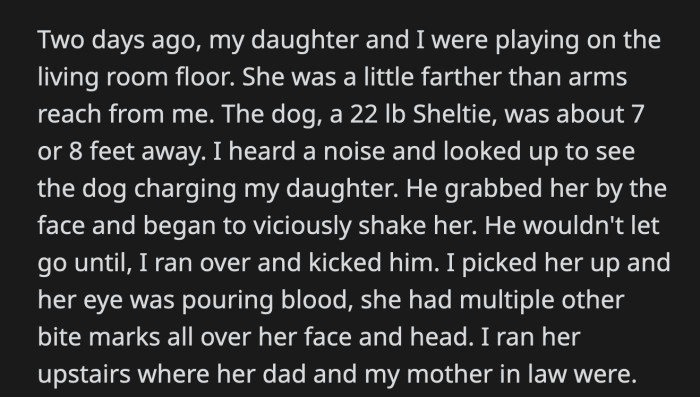
She feels betrayed that her MIL defended her dog after what he did to her granddaughter.
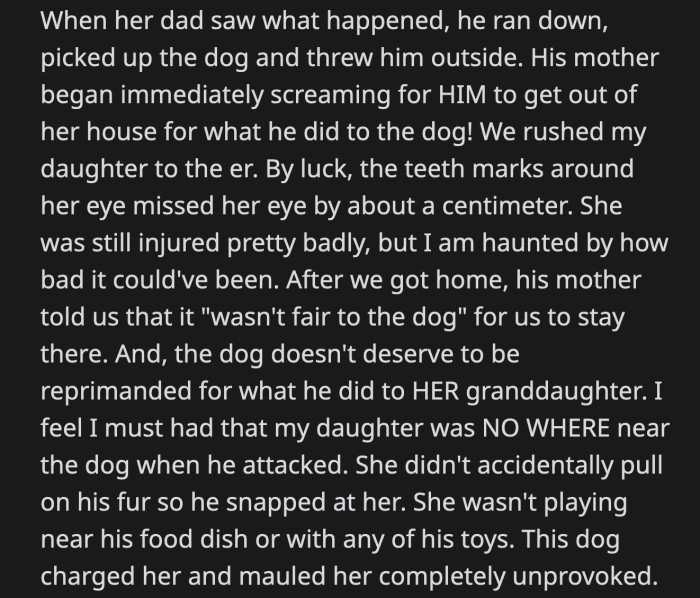
The Complexity of Attachment and Pet Ownership
The attachment that individuals form with pets can sometimes be as significant as those formed with humans. Dr. Julie Hecht, a pet behavior researcher, points out that our relationships with pets often fulfill emotional needs that may not be met elsewhere.
This attachment can lead to protective instincts over pets, even in situations where their behavior poses risks.
Understanding this emotional connection can help explain why the mother-in-law defended her dog despite its aggressive behavior.
She also feels guilty when she thinks that the dog should be put down for mauling her child.
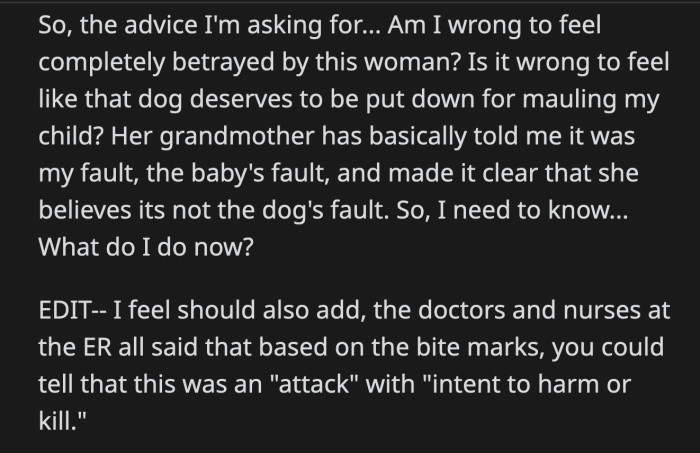
MIL said she still wants OP and her daughter in her life, but disowned her son for punishing her dog. OP doesn't know if she has it in her to be around MIL.
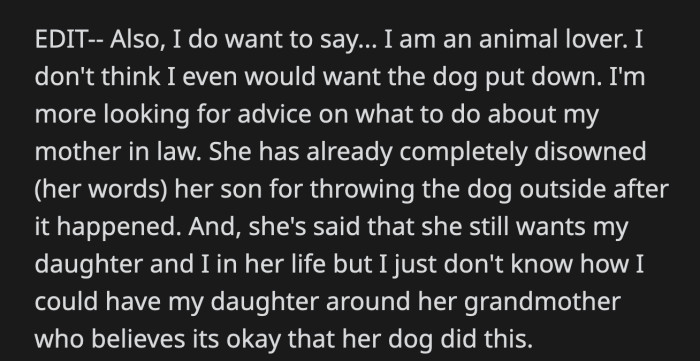
MIL can't even acknowledge her dog's dangerous behavior. She shouldn't be trusted around OP's baby again.

Interestingly, studies by Dr. William Doherty, a family therapist, indicate that pet owners often form deep emotional attachments to their pets, which can sometimes obscure their judgment regarding their pets' behavior. He notes, "When people are emotionally invested, they may overlook concerning behaviors, interpreting them as harmless quirks instead of recognizing potential risks." This emotional bond can lead to a dismissal of problematic behaviors, which is crucial to address for the safety of all family members.
She could have committed to behavioral training for her dog, but she completely absolved him of any responsibility.
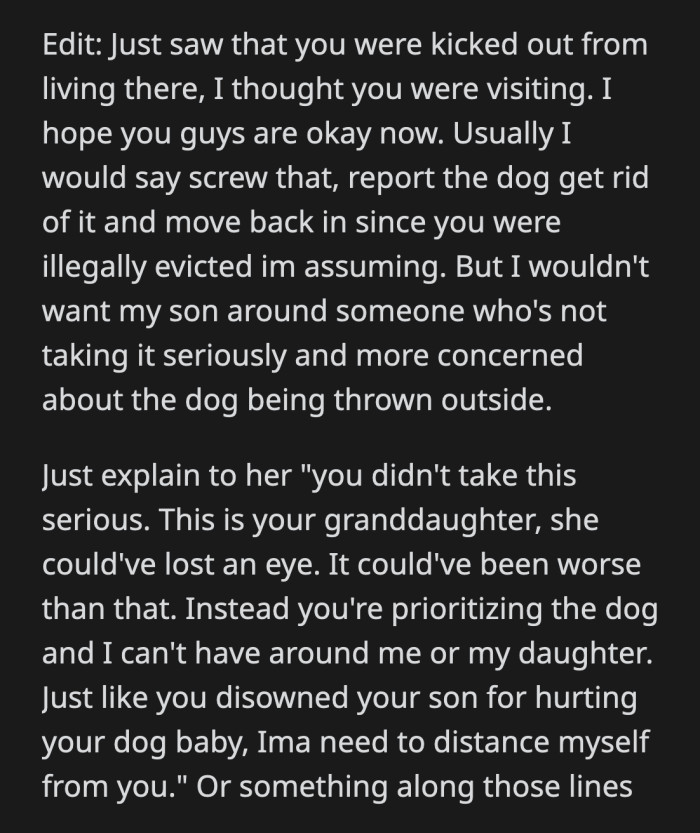
A responsible pet owner would do everything to ensure their dog is safe to be around humans; MIL doesn't belong in that category.
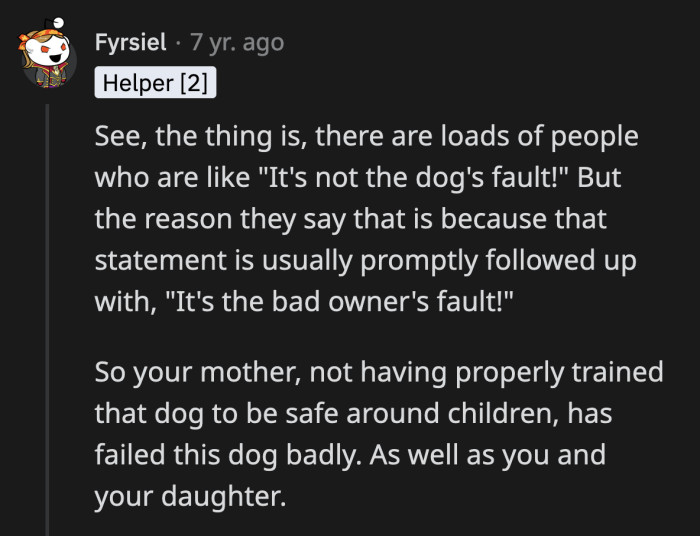
She can't even care enough to make sure her family is safe around her dog. I doubt she concerns herself with thoughts of other people.
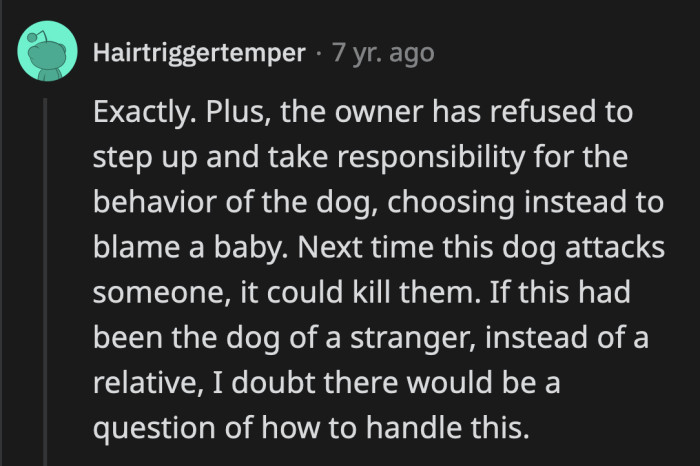
The Psychology of Defense When Threatened
When faced with a potential threat to a loved one, whether human or animal, individuals often resort to defensive behaviors.
This reaction is rooted in the psychological concept of attachment theory, which highlights how strong bonds can lead to heightened protective instincts.
Research has shown that these instincts are not only biological but also influenced by past relational experiences.
OP added a comment. The dog tried to charge at her daughter again. Her husband had to throw the dog out to protect their daughter.
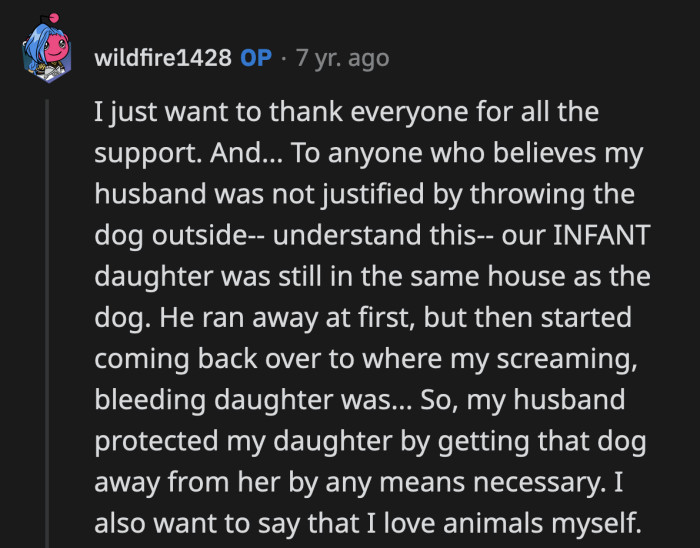
OP made it clear she had no secret agenda against animals. She had dogs herself. She didn't misrepresent how the events happened despite what other Redditors suspected.
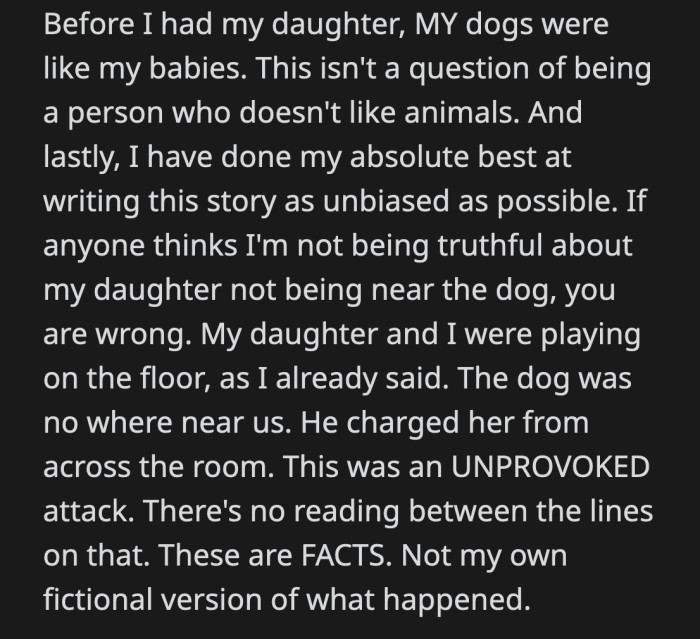
Kicking the dog out of the house was the gentlest thing they could have done given what happened moments before. A Redditor said they wouldn't have been as kind.
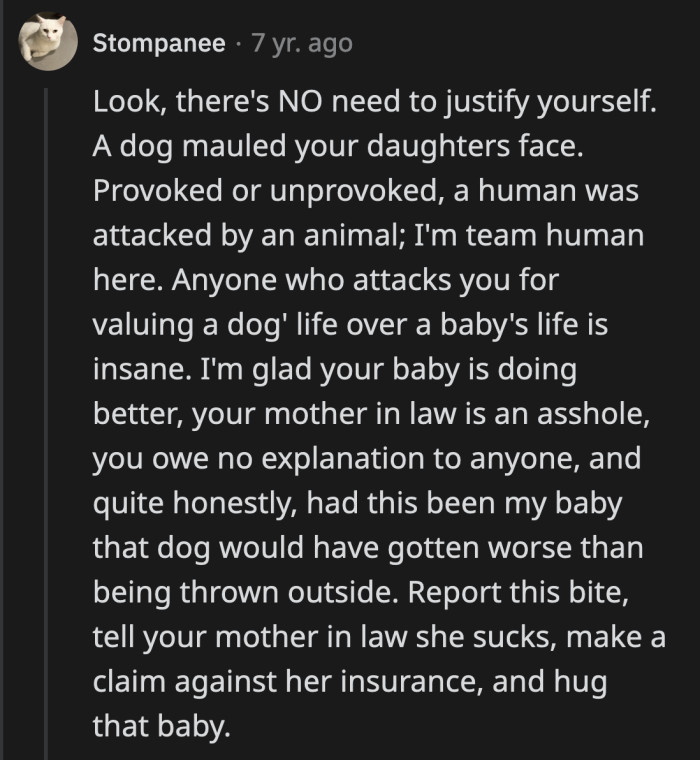
For families navigating these complex dynamics, open communication is essential.
Family therapists often recommend setting clear boundaries regarding pet behavior and ensuring that all members feel safe around animals.
This can be achieved through training and socialization of pets, as well as discussions about acceptable behaviors in family settings.
OP and her family are out of her MIL's house.
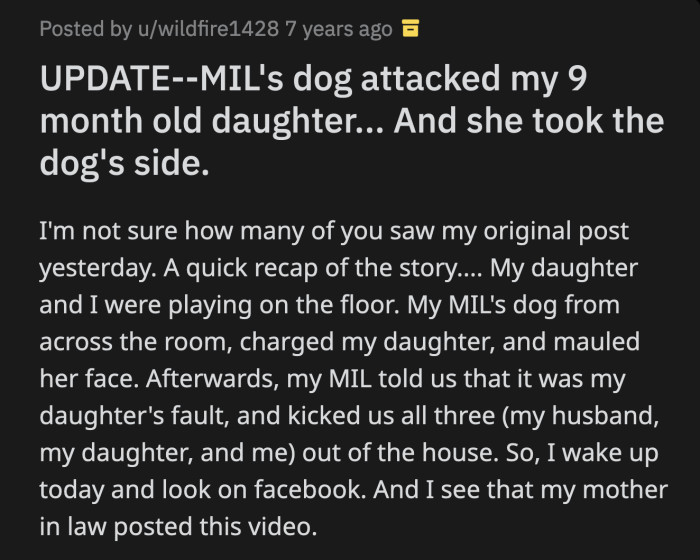
MIL shared this post on Facebook two days after her dog attacked her defenseless 9-month-old granddaughter.
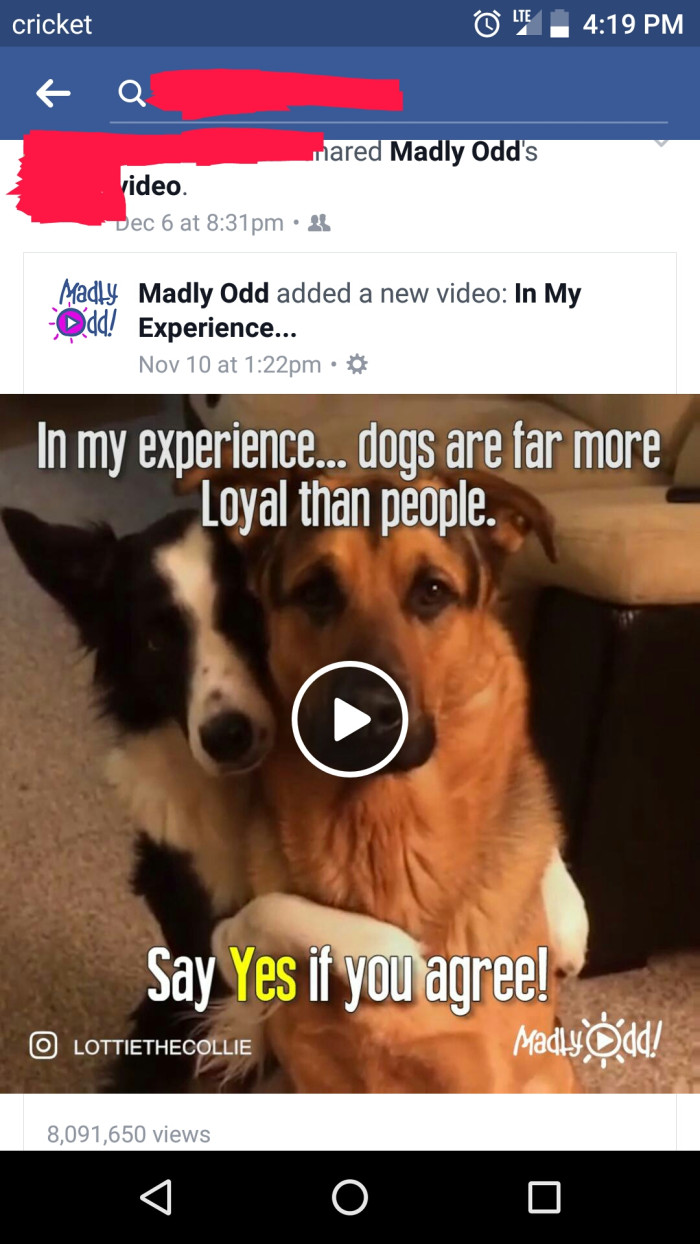
OP was insulted by MIL's post.
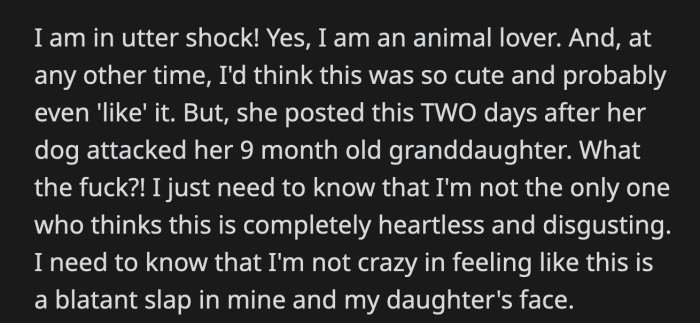
In cases where aggressive behavior is present, seeking professional help from a veterinarian or animal behaviorist can be crucial.
Research shows that behavioral interventions can significantly reduce aggression and improve safety within family environments.
Addressing these issues promptly can prevent escalation and ensure a harmonious coexistence.
The hospital reported the attack to their local Health Department. OP and her husband decided to file a police report and consult a lawyer after they moved out of MIL's house.

MIL's refusal to accept how dangerous her dog could be tells us she won't do anything to correct his behavior.

Pet owners love their dogs. Loving them means training them well enough to keep other people and our pets safe. It doesn't mean ignoring their potentially dangerous nature.
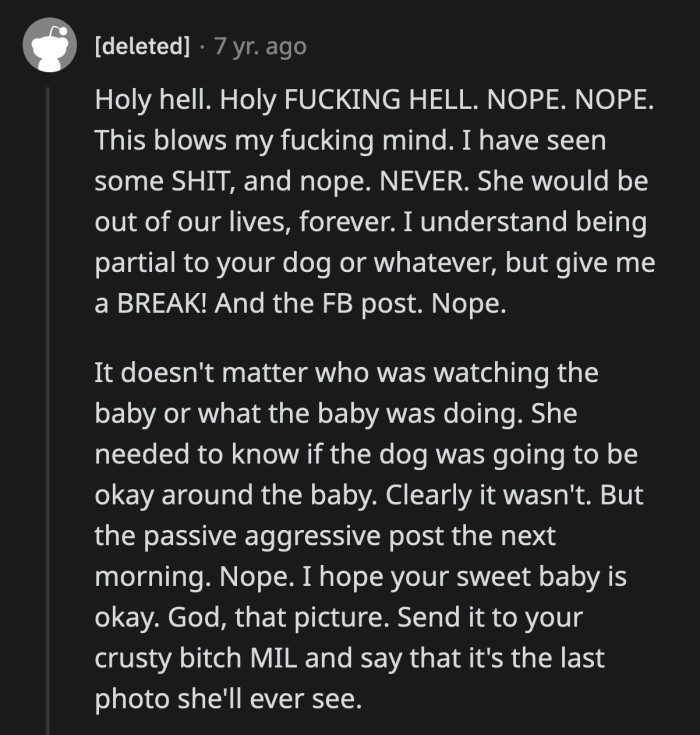
OP can set the record straight with one photo of her baby's injuries.

When MIL's dog attacks another human again, what will happen then? I doubt they will be as forgiving as OP.
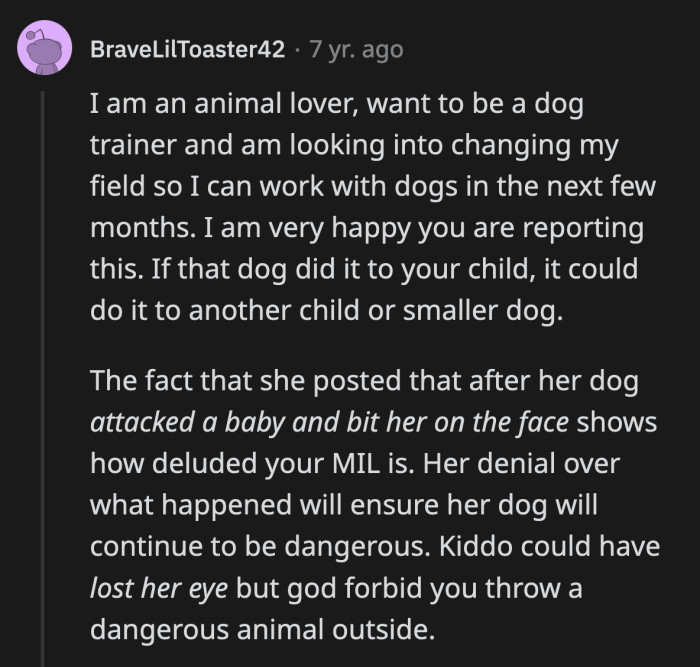
OP should definitely preemptively block MIL on everything to avoid further drama.

Dogs are great companions when they are trained correctly. MIL is a poor pet owner as long as she refuses to acknowledge her dog can snap at any moment because she refuses to retrain him.
Her misplaced loyalty to her dog cost her any hope for a relationship with her granddaughter. OP and her husband reacted appropriately and admirably when their child's life was literally on the line, despite what MIL said.
Psychological Analysis
This scenario highlights the deep emotional connections that can form between pets and their owners. From a psychological perspective, these attachments can sometimes lead to distorted perceptions of a pet's behavior, emphasizing the need for clear communication about safety and boundaries.
Analysis generated by AI
Analysis & Alternative Approaches
Understanding the emotional complexities of pet ownership can help families navigate conflicts involving pets more effectively.
As studies suggest, fostering safe and responsible pet behavior is essential for maintaining harmony in family dynamics.



